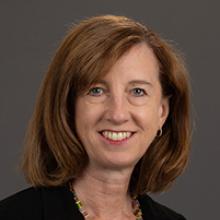Research in Action: Connecting Research With Practice to Improve School Leadership
To stay current on the most effective strategies for school improvement, Catherine Barbour keeps a close eye on new research. “We’re hungry for new data and case studies,” says Barbour, who leads the school improvement turnaround technical assistance team at AIR. “The more we have that kind of guidance, the more effective we can be in the field.”
At AIR, researchers and technical assistance providers collaborate to put the most authoritative and timely information to practical use. For example, school improvement research led by AIR Managing Researcher Kerstin Le Floch has had a huge influence on the strategies used by Barbour and her team.
For the Study of School Turnaround, Le Floch and other experts studied 25 persistently low-performing schools that were implementing federally funded School Improvement Grants. According to the study results, the schools that reported progress had strategic leaders who could articulate a theory of change. “Leaders who operate with a theory of change can explain the reform initiatives—and tell you why they’re being implemented—and describe long-term vision,” Le Floch says. “Then you can talk to teachers and hear those same things. The message is getting through.”
Developing a Concrete Plan to Improve School Leadership
 While working on school improvement at three Midwestern high schools, Barbour noticed an ad hoc approach by school leaders that was rooted more in expedience than in strategy. “They were just trying to get their activities going and thought the activity itself would get them moving in the right direction,” Barbour says. “That’s not the case, however.” According to Barbour, “We realized in working with Kerstin that our leaders didn’t have a concrete turnaround plan—something that we know from her research is crucial in building commitment and buy-in from teachers.”
While working on school improvement at three Midwestern high schools, Barbour noticed an ad hoc approach by school leaders that was rooted more in expedience than in strategy. “They were just trying to get their activities going and thought the activity itself would get them moving in the right direction,” Barbour says. “That’s not the case, however.” According to Barbour, “We realized in working with Kerstin that our leaders didn’t have a concrete turnaround plan—something that we know from her research is crucial in building commitment and buy-in from teachers.”
With LeFloch’s research in hand, the AIR school turnaround team developed leadership training to help principals and school leadership teams identify a theory of change to guide their work. Training focused on answering questions such as: Why were these improvement approaches and activities selected? How will they work together to achieve the desired outcomes? How will they be monitored? The training concludes with the team developing a graphic depiction of their turnaround plans to keep teachers and leaders focused on school improvement.
“Now there is a common language for the turnaround team, schools, and districts that we can anchor to a really substantial piece of research,” Barbour says. “That gives everyone a compelling reason to put in the effort.”
As a key member of Barbour’s team, Le Floch also regularly meets with school leadership, presenting research in-person and through webinars. “The more Kerstin and I have gotten to know each other and our work, the more we’ve gotten synched up,” Barbour says. “We’re informing each other’s work in a way that can help school leaders achieve the best possible outcomes.”
Key AIR Work in School Turnaround
The Study of School Turnaround
Through a contract funded by the U.S Department of Education, AIR researchers studied 25 low-performing schools that received federally funded School Improvement Grants. During a three-year period, AIR and its partners visited a diverse set of these schools and interviewed superintendents, principals, external support providers, instructional coaches, teachers, parents, and students on why the schools had been chronically low performing, which strategies the schools chose to implement, and how implementing these strategies changed the schools.
District and School Improvement Center
AIR currently leads the turnaround and transformation efforts for schools in Illinois, Michigan, Missouri, New York, and Virginia and is an approved lead or supporting partner in additional states. Our work extends beyond the School Improvement Grant and includes significant experience at the district and school levels, such as leadership coaching, auditing curriculum, content coaching for all levels, developing improvement plans, coaching staff on analyzing data, and integrating data-driven decision making into school and district daily practices.
